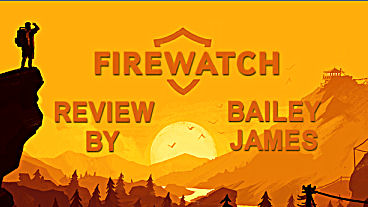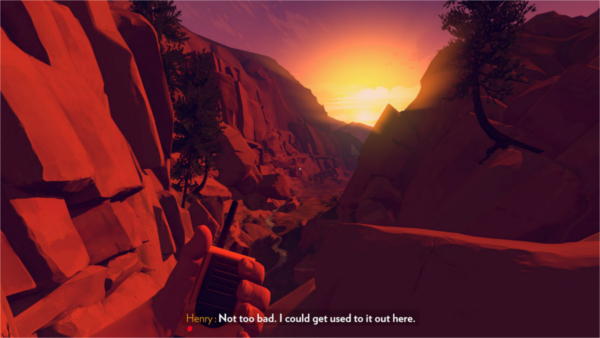
Firewatch Review
Everything from its arresting visuals and offbeat characters to its intuitive gameplay and compelling story has been executed flawlessly







Genre: Adventure
Release date: February 8, 2016
Making a truly remarkable video game is an improbability. Artists, programmers, designers, voice actors, animators, writers, and musicians must all create their well-sculpted pieces that then come together to construct a cohesive work of art. Most great games have glaring flaws; wonky control schemes, tedious puzzles, dull artistic designs, and lackluster endings have all plagued even the best and most enduring titles.
Yet despite all odds, San Francisco studio Campo Santo’s inaugural release, Firewatch, is as close to a perfect specimen as anyone could reasonably hope for. Everything from its arresting visuals and offbeat characters to its intuitive gameplay and compelling story has been executed flawlessly. There are no loose threads to snip off this unimpeachable and absorbing masterwork.
It’s the summer of 1989 and you are Henry, a stocky schlub in his late thirties who’s taken a position in the forests of Wyoming as a fire lookout. Under ideal circumstances, the job would involve long days relaxing in the tower and taking in the scenery, but the combination of an exceedingly dry summer and a fraught personal life Henry doesn’t want to address means there are plenty of distractions to keep him away from his post. Your only point of contact is Delilah, your supervisor at the other end of a short-wave radio, and together you’ll traverse the fields, forests, and cliff faces as you maintain order and seek out answers to lingering questions. Before long, the innocuous beginnings of Henry’s duties as a lookout evolve into a mystery that sparks confusion, tension, and distrust; to say more would be to rob the player of the joys of discovery.
The game does a particularly skillful job of investing the player in Henry’s emotional headspace early on. The beginning is a lovely scripted sequence that summarizes the last few years of Henry’s life and allows the player to make choices about how exactly the protagonist came to take the job in the Wyoming wilds. They’re small yet meaningful decisions — what to say to your future wife at a bar, which dog to adopt, how to react emotionally to bad news. Details matter, and small touches like these make the gameplay feel more personal and concerted. It doesn’t make a difference in the big picture whether you leave Henry’s wedding ring lying on the table or pick it up to slide back on, but it makes a difference to my emotional experience of the story.
Firewatch also nails the multilayered tone of Henry’s experience, which doesn’t necessary lend itself well to a game. Spotting fires is a job that entails moments of excitement amid vast swaths of tedium, and the game jumps forward in days, sometimes for weeks at a time, to bring us to the relevant parts of the story. But we also get to catch glimpses of the mundanity in between — going fishing, eating sandwiches, having long and meandering conversations with Delilah. The dynamic between them that’s so taut and ever-changing is completely believable when the story is so robustly told that you can imagine what happens in the in-between parts you don’t get to see.
The visuals of Firewatch are a feast for the eyes. Every screen is lush with color and life. Trees rustle, sunshine dapples the rocks, and vistas sprawl and tumble majestically towards the horizon when viewed from high ground, making a great case for retreating from society and technology into the wilderness. I delighted in exploring the map and finding new spots to appreciate, and especially enjoyed getting to spend full days with Henry, watching the light turn from a white noon glare to the insistent orange-gold of sunset. Even the design elements like the fonts and menus are stylish and add tangibly to the pleasantness of the overall experience.

For a game with a lot of tension and energy, the soundtrack avoids the melodramatic squeal of violins in favor of Twin Peaks-y guitar twangs that mingle with the ambient crunches and rustles of the wilderness. Sometimes the sounds feel grand and daring, other times the sense of isolation hangs thick and humid in the air. The atmosphere completely sells a person on the advantages of unplugging from the grid and taking the next plane to the Rockies.
The gameplay deserves its own mention because it’s uncommonly well-done. The control scheme is simple and intuitive, and relevant button prompts are always displayed in a subtle but helpful way in case you forget how to activate your flashlight or rappel down a rocky slope. For those who want to practice their orienteering and make the game more challenging, you can toggle off your own location on the map and use only the landscape as your guide. Best of all, pretty much any interesting scrap of information or object can be stowed away in Henry’s pack for later, giving packrats the satisfaction of collecting everything in sight.
There’s a pleasurable physicality to the way Henry experiences the world that goes a long way toward making him feel real. Every time he climbs over a log or jumps off some rocks we see his legs springing, bracing, clambering. When you pick up a pinecone or bottle of whiskey, a hairy arm swipes it up and brings it in for a closer look. His hands twiddle the dials of locks, clutch the map as he hikes, and examine objects by turning them over in his palm. Every single movement Henry makes feels like something a real person could do in the same situation, which is a genius touch in a game that is so much about being present in the physical, natural world.
Gamers who are used to stories that end with an almighty bang will be thrown off by Firewatch. It’s a subtle game with a complex tone that encompasses a bevy of emotions including awe, aversion, contentment, guilt, paranoia and ennui, and the ending is understated to an extent that you may not really believe it’s coming until it’s over. Normally this would necessitate at least a small complaint, but even in that regard the game has made an intentional move that works perfectly with everything that comes before it. Firewatch is a story about what it means to escape—from society, from technology and from having to deal directly with painful issues in life, and it offers an honest look at the likely outcome of that choice. No matter how deeply you penetrate the woods, no matter what adventures snarl themselves around your hiking boots, you can’t outrun yourself.
|
+ Nuanced character relationship
+ Stunning natural environments
+ Clean interfaces and easy navigation
+ Easy-to-use controls and intuitive gameplay
+ Tight, compelling story
+ You get to adopt and name a turtle!
– Left me wishing for more time with Henry |

|
Processor: Intel Core i3 2.00 GHz or AMD equivalent
Memory: 6 GB RAM
Graphics: NVIDIA GeForce 450 or higher with 1GB Memory
DirectX: Version 11
Storage: 4 GB available space
Processor: 2011 or newer Intel Core i5
Memory: 6 GB RAM
Graphics: NVIDIA or ATI GPU with 1 GB Memory
Hard Drive: 4 GB available space

Leave a Reply